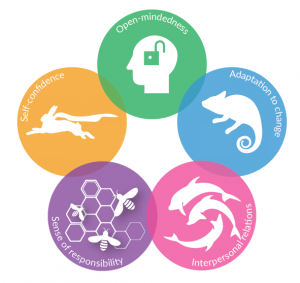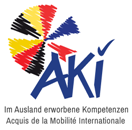Assessment and recognition of transversal competences, acquired by young adults in international mobility projects, as a means to facilitate their socio-professional integration
The AKI project in brief
AKI is a European project that contributes to the identification and the recognition of transversal competences, developed by young adults (18-30) in international mobility projects outside of school and university curricula. This project responds to the partners’ shared desire to make these competences more visible and to increase their relevance in the labour market and society.
It is funded by the Erasmus + Youth programme.
AKI consists of Belgian, French, German major international mobility operators :
- l’Office franco-allemand pour la Jeunesse (OFAJ) / Franco-German Youth Office/ Deutsch-Französisches Jugendwerk (DFJW) ;
- l’Office franco-québécois pour la Jeunesse (OFQJ) / Franco-Quebecois Youth Office ;
- l’Institut Supérieur de Formation Permanente (INSUP) / Vocational Training Institute / also this project’s coordinator ;
- l’Union Wallonne des Entreprises (UWE) / Walloon Union of Companies.
Associated partners have joined the partnership to enrich the project’s developments :
- le Bureau International Jeunesse Wallonie Bruxelles (BIJ) / Brussels International Youth Bureau ;
- les Offices Jeunesse internationaux du Québec (LOJIQ) / International Youth Offices of Quebec.
International mobility experiences allow the participant for a new dynamic and contribute to develop certain competences. Participants complete their project with pride and undertake their commitments to society, business, the community, and civil organisations with enhanced confidence. Mobility experiences prompt the participants out of their day-to-day reality to venture away from their comfort zone by modifying their habits.
Openness to the world, to others and their differences, indubitably lays the grounds for citizenship and community-awareness.
Technical competences, whether specific or linguistic, can be formalized with reference to a professional skills base or on the Common European Frame of Reference for Languages (CEFRL). The task is harder when it comes to transversal competences, such as the ability to adapt or the ability to get involved in a group.
Starting from this point, the partnership has developed a guidebook for five transversal competences acquired in international mobility experiences dedicated to :

This guide features a sheet for each transversal competence that allows those who need it to understand how a competence can be developed during an international internship and then how it can serve in one’s life as a worker or as a citizen.
A toolkit complements the guide in practical support to it.
It includes tools to enable the participant to reflect on his or her mobility experience and to value it (with a participant’s questionnaire, a tutor’s record sheet, and an individual feedback sheet).
The AKI tools were developed to :
- demonstrate that international mobility is a good way to develop these transversal competences;
- help young people to verbalise their experience, to identify and value these competences developed thanks to projects carried out abroad ;
- make employers understand that international mobility can generate the competences they are looking for ;
- explain how these competences can be useful socially and professionally.
The AKI partnership’s work rests on its knowledge of the impact of mobility programmes in Germany, Belgium, France and Quebec.
It drew upon the expertise of researchers in Youth programmes and employers [a diversity of professionals] in Europe and Quebec.
CONTACT :
Anne Larramendy : +33 5 56 15 12 45 – alarramendy@insup.org
Alexandra Sanchis : +33 5 56 15 12 45 – asanchis@insup.org
